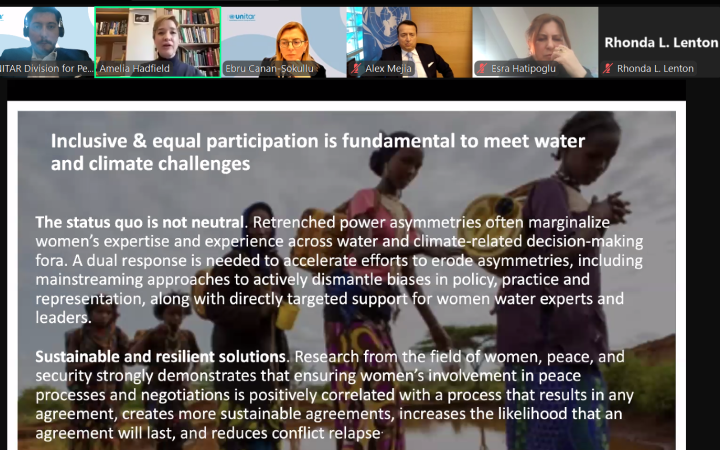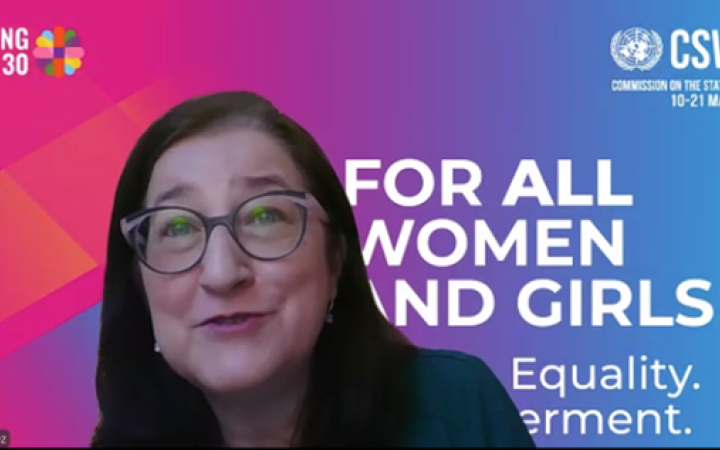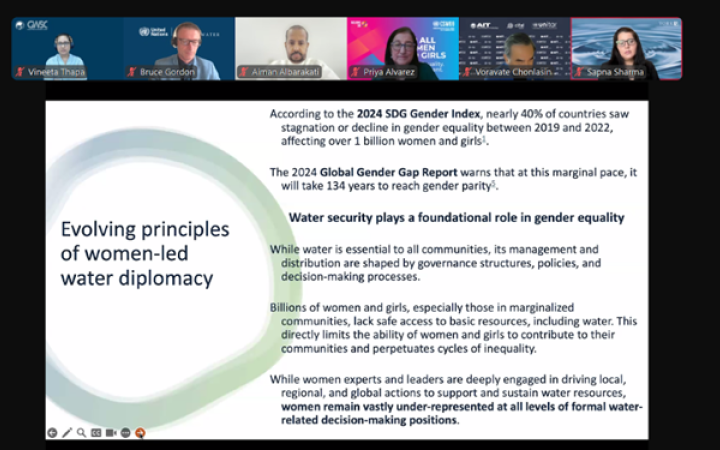World Water Day Side Event" title="UNITAR Global Water Academy 2025 World Water Day Side Event" loading="lazy">
26 March 2025, Geneva, Switzerland - On the 30th anniversary of the landmark Beijing Declaration, UNITAR convened a virtual side event, "Bridging Gender Gaps and Advancing Equity in Water Governance." In conjunction with World Water Day for the International Year of Glaciers' Preservation, the event emphasised the critical importance of glaciers to freshwater resources. The gathering brought together experts and practitioners to address the inextricable link between gender equity and sustainable water management, reinforcing that women's inclusion is not simply about fairness but an essential element for effective and resilient water governance.
The panellists included:
- Mr Alex Mejia, Director of the Division for People and Social Inclusion, UNITAR
- Mr Bruce Gordon, Vice Chair, UN-WATER, and Head of Water, Sanitation, Hygiene, and Health, WHO
- Ms Mary Matthews, Ad Interim Water Lead, Ocean Advisor/Ocean Innovation Challenge Manager, UNDP
- Ms Priya Alvarez, Senior Expert on Gender Equality Policies and Legislation, UN Women
- Dr Rhonda L. Lenton, President and Vice-Chancellor, York University
- Prof Esra Hatipoğlu, Rector, Bahçeşehir University
- Prof Amelia Hatfield, Director, CIFAL Surrey, Co-Director of the Institute for Sustainability, University of Surrey
- Prof Sapna Sharma, Professor, Department of Biology, York University
- Dr Aiman Jameel Albarakati, Director, CIFAL Saudi Arabia
- Dr Vineeta Thapa, GEDSI Lead, Global Water and Sanitation Centre, Asian Institute of Technology
- Dr Voravate Chonlasin, Director, CIFAL Bangkok; and Dr Ebru Canan-Sokullu, Associate Director of CIFAL Global Network, UNITAR
Opening Remarks
Mr Mejia, Director of the Division for People and Social Inclusion at UNITAR, opened the event, welcoming participants and emphasizing the urgency of addressing gender disparities in water governance. He noted that this year's World Water Day theme, "Glacier Preservation," underscores how climate change-driven glacial melt exacerbates water scarcity, disproportionately affecting marginalized communities, particularly women and girls. He articulated the event's commitment to amplifying the voices of those often unheard:
Women and girls bear the burden of water collection and lack representation in decision-making roles. Our commitment today is to truly understand the dynamics behind this challenge, to go the extra mile and understand how they suffer from their perspective on what should be our own role in fixing this situation.
Panel Discussion
The discussion began with UN-Water Vice Chair, Mr Gordon, who presented the sobering statistic that 2 billion people live in households without reliable water access. He highlighted that women are the primary water collectors in two-thirds of these households, facing health risks, safety concerns, and missed opportunities for education and employment. He stressed that "there is a need to cement 'leave no one behind' in SDG 6b with women in water governance in general. If women are involved, we have better outcomes, and that's simply because they're impacted the most."
Prof Sharma reinforced this point, sharing insights from data collected by UNICEF that women spend 200 million hours daily collecting water, equivalent to 23,000 years, which is time that could otherwise be used for education and career advancement.
Ms Matthews from UNDP built on this position, noting that increasing household water access could empower 640 million women to become active citizens and economic contributors. Recognising the need for more encouragement for women to take on leadership positions, she emphasised that:
We (women) are in water. We are here. We have leadership roles. Most recently, our Secretary-General appointed Ms Retno Marsudi (who is a woman) as the Special Envoy for Water, a crucial step in elevating women's roles in water governance.
Ms Alvarez of UN Women highlighted that water insecurity disproportionately affects women and girls, making water security and gender equality inseparable. She emphasised the link between water scarcity and increased child marriage rates in crisis-affected areas. Furthermore, she noted that the water crisis contributes to increased gender-based violence, while social norms sideline women from decision-making. To emphasise women's capacity as agents of change, not just victims, she stated that:
Indigenous women play a key role in safeguarding water and biodiversity-in India, they successfully blocked resource depletion and contamination by multinational corporations. - She stressed the need for political will, highlighting how "Political will is essential"-for example, Morocco has achieved a 40% target for women's participation in national water governance.
President Lenton of York University delved into systemic inequalities that prevent women from fully participating in water governance. She noted that despite being primary water providers, women hold only 30% of leadership positions in Canada's water-related sectors. Rector Hatipoğlu from Bahçeşehir University further complemented this position by identifying barriers to women's participation, including cultural norms and limited access to education. She emphasised her university's efforts to overcome them through targeted programmes.
Prof Hatfield of CIFAL Surrey presented a case study on applying gender equity principles in water-related negotiations, highlighting how the Women in Water Diplomacy Network promotes women's participation in politically unstable regions, leading to better water negotiation outcomes. She emphasised the necessity of investing in women to accelerate SDG6, as the status quo is not neutral due to power asymmetries and policy biases.
Dr Albarakati of CIFAL Saudi Arabia discussed the country's progress in promoting women's participation in water governance, aligning with Vision 2030. He emphasised the need for gender-disaggregated data and investing in mentorship and education within the water sector.
When we empower women in water leadership, we don't just protect resources, we unlock the resilience of entire societies. This is not an idea. It's a strategy. When women lead, water systems thrive.
Dr Thapa from the GWSC emphasised achieving gender quotas in staffing and removing barriers for Indigenous communities through localised materials and financial incentives tailored to women's needs in WASH programmes. She also highlighted the importance of including persons with disabilities in water governance discussions. Furthermore, Dr Chonlasin of CIFAL Bangkok showcased Bangkok's Water Commission, led by women, as a practical example of progress in gender-inclusive governance. He emphasised strengthening regional policies and data collection to reduce barriers to women entering governance positions.
Dr. Canan-Sokullu of UNITAR concluded the event, emphasizing that multilateral and academic approaches are both important to gender-inclusive water management, adding:
While we discuss SDGs 6 and 5, there remains significant space for SDG 17, which calls for stronger partnerships to fill the present gaps.
UNITAR Course Announcement
In celebration of World Water Day, UNITAR launched the new " Foundations of SDG 6: Clean Water and Sanitation " course. This course offers participants an opportunity to analyze SDG 6 targets, identify strategies for sustainable water management, and apply localized perspectives to water resource management. Enroll today to help achieve global water security.
Click here to learn more about the course: Foundations of SDG 6: Clean Water and Sanitation
Watch the recording here:









